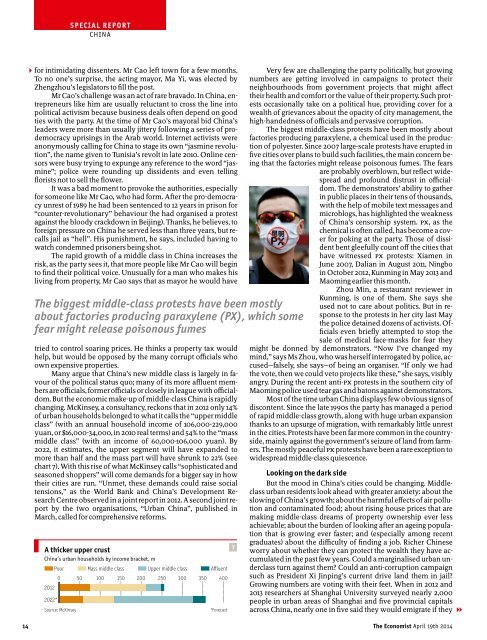The Economist - 19_25 April 2014
The Economist - 19_25 April 2014
The Economist - 19_25 April 2014
- No tags were found...
You also want an ePaper? Increase the reach of your titles
YUMPU automatically turns print PDFs into web optimized ePapers that Google loves.
SPECIAL REPORTCHINA2for intimidating dissenters. Mr Cao left town for a few months.To no one’s surprise, the acting mayor, Ma Yi, was elected byZhengzhou’s legislators to fill the post.MrCao’s challenge was an act ofrare bravado. In China, entrepreneurslike him are usually reluctant to cross the line intopolitical activism because business deals often depend on goodties with the party. At the time of Mr Cao’s mayoral bid China’sleaders were more than usually jittery following a series of prodemocracyuprisings in the Arab world. Internet activists wereanonymously calling for China to stage its own “jasmine revolution”,the name given to Tunisia’s revolt in late 2010. Online censorswere busy trying to expunge any reference to the word “jasmine”;police were rounding up dissidents and even tellingflorists not to sell the flower.It was a bad moment to provoke the authorities, especiallyfor someone like Mr Cao, who had form. After the pro-democracyunrest of<strong>19</strong>89 he had been sentenced to 12 years in prison for“counter-revolutionary” behaviour (he had organised a protestagainst the bloody crackdown in Beijing). Thanks, he believes, toforeign pressure on China he served less than three years, but recallsjail as “hell”. His punishment, he says, included having towatch condemned prisoners being shot.<strong>The</strong> rapid growth of a middle class in China increases therisk, as the party sees it, that more people like Mr Cao will beginto find their political voice. Unusually for a man who makes hisliving from property, Mr Cao says that as mayor he would have<strong>The</strong> biggest middle-class protests have been mostlyabout factories producing paraxylene (PX), which somefear might release poisonous fumestried to control soaring prices. He thinks a property tax wouldhelp, but would be opposed by the many corrupt officials whoown expensive properties.Many argue that China’s new middle class is largely in favourof the political status quo; many of its more affluent membersareofficials, formerofficialsorcloselyin league with officialdom.But the economic make-up ofmiddle-class China is rapidlychanging. McKinsey, a consultancy, reckons that in 2012 only14%ofurban households belonged to what it calls the “upper middleclass” (with an annual household income of 106,000-229,000yuan, or $16,000-34,000, in 2010 real terms) and 54% to the “massmiddle class” (with an income of 60,000-106,000 yuan). By2022, it estimates, the upper segment will have expanded tomore than half and the mass part will have shrunk to 22% (seechart 7). With this rise ofwhat McKinsey calls “sophisticated andseasoned shoppers” will come demands for a bigger say in howtheir cities are run. “Unmet, these demands could raise socialtensions,” as the World Bank and China’s Development ResearchCentre observed in a joint report in 2012. Asecond joint reportby the two organisations, “Urban China”, published inMarch, called for comprehensive reforms.A thicker upper crustChina’s urban households by income bracket, mPoor Mass middle class Upper middle class Affluent0 50 100 150 200 <strong>25</strong>0 300 350 40020122022*Source: McKinsey*Forecast7Very few are challenging the party politically, but growingnumbers are getting involved in campaigns to protect theirneighbourhoods from government projects that might affecttheir health and comfort or the value oftheir property. Such protestsoccasionally take on a political hue, providing cover for awealth of grievances about the opacity of city management, thehigh-handedness ofofficials and pervasive corruption.<strong>The</strong> biggest middle-class protests have been mostly aboutfactories producing paraxylene, a chemical used in the productionof polyester. Since 2007 large-scale protests have erupted infive cities over plans to build such facilities, the main concern beingthat the factories might release poisonous fumes. <strong>The</strong> fearsare probably overblown, but reflect widespreadand profound distrust in officialdom.<strong>The</strong> demonstrators’ ability to gatherin public places in their tens of thousands,with the help ofmobile text messages andmicroblogs, has highlighted the weaknessof China’s censorship system. PX, as thechemical isoften called, hasbecome a coverfor poking at the party. Those of dissidentbent gleefully count off the cities thathave witnessed PX protests: Xiamen inJune 2007, Dalian in August 2011, Ningboin October 2012, Kunming in May 2013 andMaoming earlier this month.Zhou Min, a restaurant reviewer inKunming, is one of them. She says sheused not to care about politics. But in responseto the protests in her city last Maythe police detained dozens ofactivists. Officialseven briefly attempted to stop thesale of medical face-masks for fear theymight be donned by demonstrators. “Now I’ve changed mymind,” says Ms Zhou, who was herselfinterrogated by police, accused—falsely,she says—of being an organiser. “If only we hadthe vote, then we could veto projects like these,” she says, visiblyangry. During the recent anti-PX protests in the southern city ofMaomingpolice used teargas and batons against demonstrators.Most ofthe time urban China displays few obvious signs ofdiscontent. Since the late <strong>19</strong>90s the party has managed a periodof rapid middle-class growth, along with huge urban expansionthanks to an upsurge of migration, with remarkably little unrestin the cities. Protests have been far more common in the countryside,mainly against the government’s seizure of land from farmers.<strong>The</strong> mostlypeaceful PX protestshave been a rare exception towidespread middle-class quiescence.Looking on the dark sideBut the mood in China’s cities could be changing. Middleclassurban residents look ahead with greater anxiety: about theslowingofChina’s growth; about the harmful effects ofair pollutionand contaminated food; about rising house prices that aremaking middle-class dreams of property ownership ever lessachievable; about the burden of looking after an ageing populationthat is growing ever faster; and (especially among recentgraduates) about the difficulty of finding a job. Richer Chineseworry about whether they can protect the wealth they have accumulatedin the past few years. Could a marginalised urban underclassturn against them? Could an anti-corruption campaignsuch as President Xi Jinping’s current drive land them in jail?Growing numbers are voting with their feet. When in 2012 and2013 researchers at Shanghai University surveyed nearly 2,000people in urban areas of Shanghai and five provincial capitalsacross China, nearly one in five said they would emigrate if they14 <strong>The</strong> <strong>Economist</strong> <strong>April</strong> <strong>19</strong>th <strong>2014</strong>1


